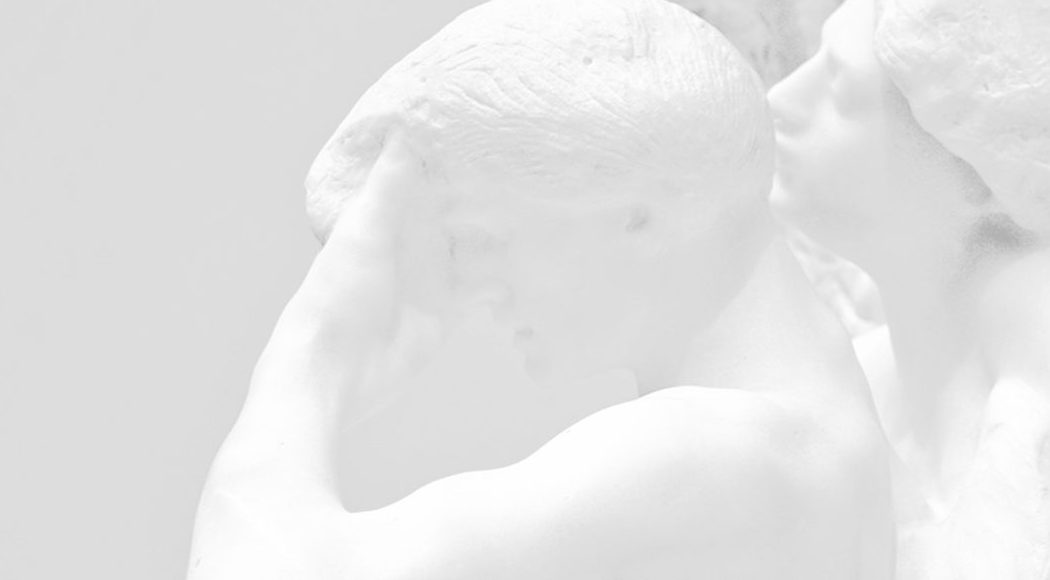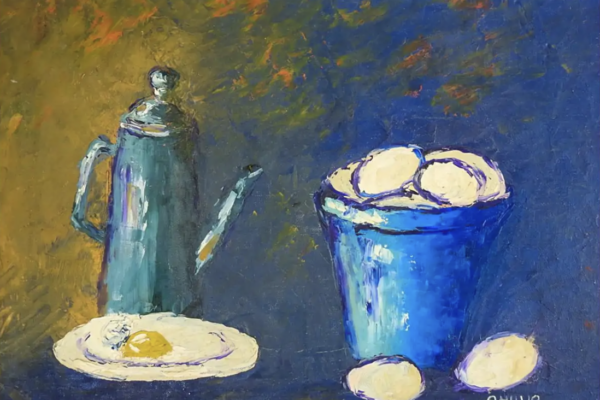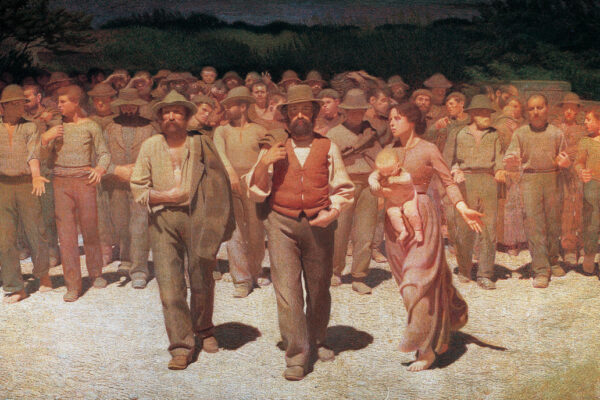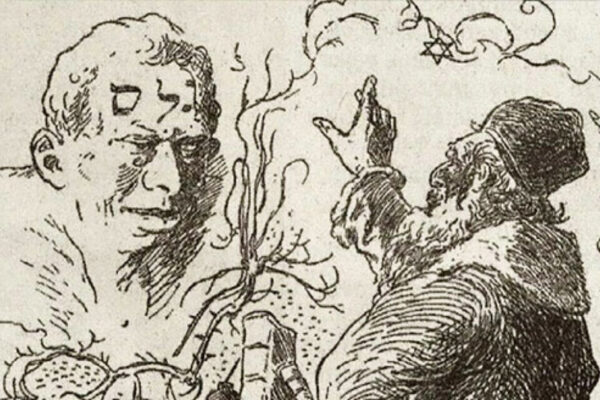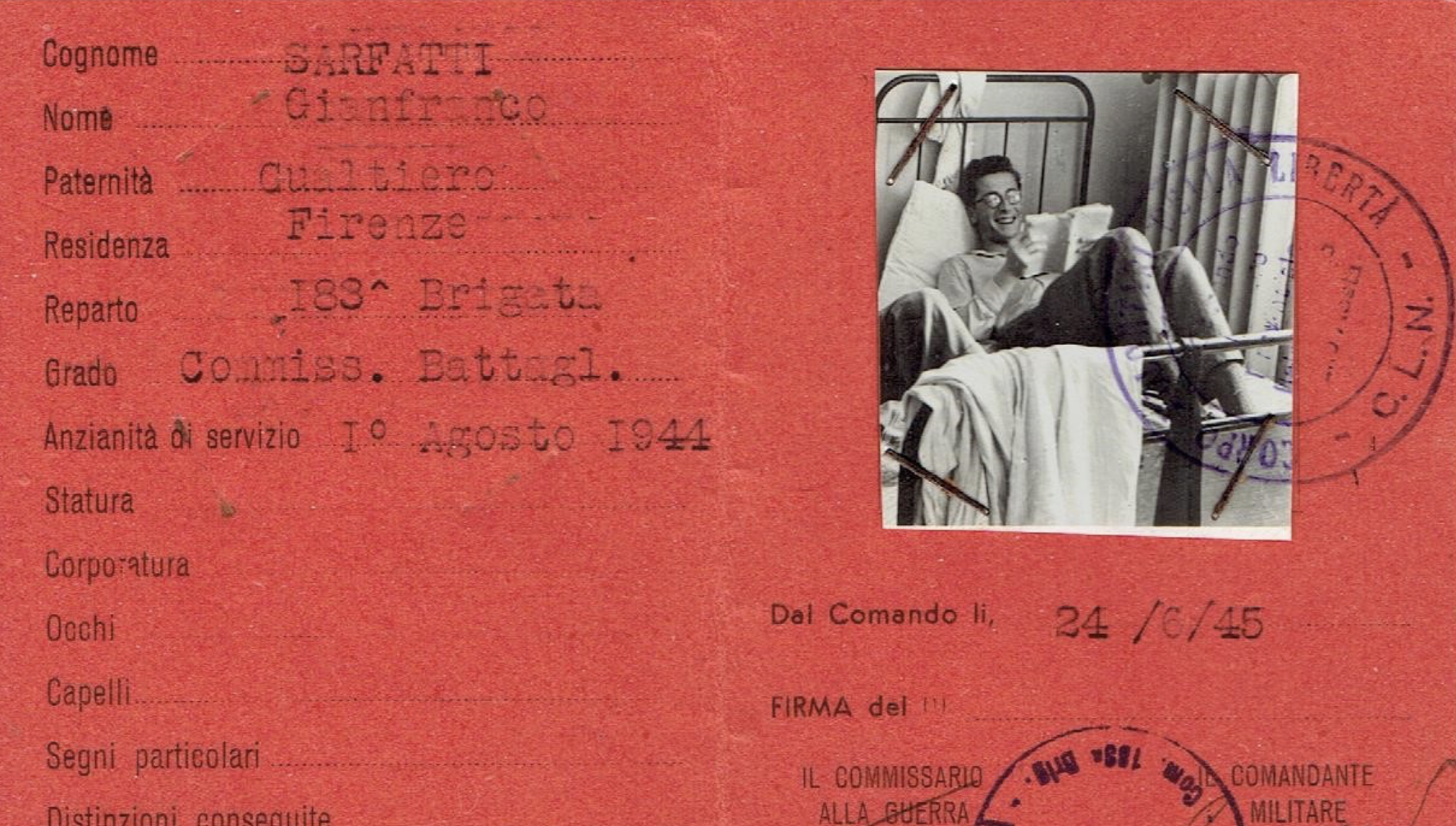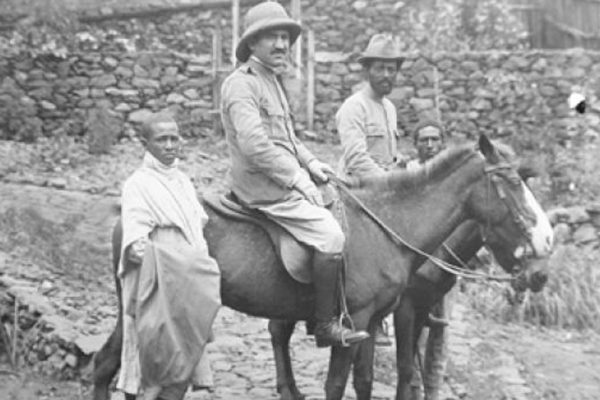In the chapter Phosphorus in the Periodic Table Levi tells us of a love story that took place in 1942, when he was employed in futile research after an oral cure for diabetes. Beatrice and Virgil in one, Giulia Vineis was responsible for the job offer and becomes his guide, in the factory as well as in life and love. They knew each other from school she was strong, passionate, and catholic and above all engaged. Phosphorus, the luminous burning noxious element is all about life under Fascism and the racial rules, about the way a regime insinuates itself in human intimacy and its language.
Brave and honest Giulia thinks that “Racial laws are a bunch of stories, what importance could they have anyway?”[1] And one night during a storm, life for Levi almost became wholly other:
There was a fierce storm; Giulia endured two thunderclaps and at the third sought refuge with me. I felt the heat of her body against mine, dizzying and new, known in dreams, but I did not return her embrace; if I had, perhaps her destiny and mine would have gone crashing off the rails, toward a common, completely unpredictable future.[2]
The sum of these thoughts is about, fortuna, an Italian term Levi employs frequently and seriously to consider ethically his own luck.[3] We know they discussed the matter in their meetings after the war as Levi discreetly informs us. Inevitably Phosphors it is about a light that had not been lighted and above all about how a Christian love would have most likely avoided Auschwitz, though one can never know. It is also just as much about the intervention of law on the proper body, the insecure Jew frozen by law into the impossibility of masculinity. One day Giulia asks him to drive her on his bicycle to do battle with the parents of her fiancé that did not approve of her:
Giulia was arguing with me like I was her Don Rodrigo, I was overcome by an absurd hatred for my unknown rival. A gòi and she a gòia, according to the atavistic terminology: and they would be able to marry. I felt, perhaps for the first time, a nauseating sensation of emptiness growing inside of me: this, then, meant being other; this was the price for being the salt of the earth. To carry on the crossbar of your bicycle the girl you desire, and to be so distant from her that you can’t even fall in love: to carry her on the crossbar to Viale Gorizia to help her become another’s, and disappear from my life.”[4]
The weight of such considerations is largely attenuated in this story by a the form of the telenovela, the allusion that catches our eye is to Alessandro Mazoni’s novel, I Promessi Sposi – The Bethrothed as translated into English. The allusion is comically inverted, Levi cast in the role of Don Rodrigo, the maleficent nobleman that separates Renzo from Lucia. Marco Belpoliti and Giovanni Tesio have already shown that the The Betrothed is of great importance to Levi, one of those books that he didn’t include in his personal anthology “La ricerca delle radici”, because their presence is so obvious “it would have been like describing under ‘particular signs” a person as having two eyes”.[5]
According to Belpoliti, Manzoni is central to Levi regarding physical gestures and the theme of the oppressed.[6] This might be true, though what is certainly missing is the role of The Betrothed in figuring love, especially in its particular Italian Catholic sense. As Levi has stated, The Betrothed is the bedrock of Italian identity as such. In the novel, Renzo and Lucia are separated by the will of Don Rodrigo, forcing them apart and abducting Lucia, in a land of perverted justice.[7] Only in the end, through the destruction brought on by the plague, is Renzo miraculously reunited with his love.
The irony of Levi cast in the role of Don Rodrigo, the perpetrator, should not occlude how the allusion here highlights the importance of the Betrothed in allowing Levi to meaningfully engage a Christian concept of love, one that brings together, survivor perpetrator and carnal love. Renzo, the survivor of the plague, arrives in death stricken Milano, where he heads to the Lazzaretto, a space much like the infirmary of Buna where the sick and dying are confined. The images are eerily reminiscent of the last part of If This is a Man, as the Germans leave Levi and the other inmates to die of their maladies. In the Lazaretto Renzo meets Fra Cristoforo, who in the first part of the tale, tried to help the couple, and when Renzo vows to avenge himself on Don Rodrigo, if he cannot find Lucia, Fra Cristoforo responds with a vehement reproach:
You have dared to meditate revenge; but He (God) has power and mercy enough to prevent you…You know, and… He can arrest the hand of the oppressor: but, remember. He can also arrest that of the revengeful… You may hate and be lost forever; you may…rest assured that all will be punishment until you have forgiven—forgiven in such a way, that you may never again be able to say, I forgive him.”
“Yes, yes,” said Renzo, with deep shame and emotion: ” I see now that I have never before really forgiven him I see that I have spoken like a beast, and not like a Christian : and now, by the grace of God, I will forgive him; yes, I’ll forgive him from my very heart.”
” And supposing you were to see him ?”
” I would pray the Lord to give me patience, and to touch his heart.”
“Would you remember that the Lord has not only commanded us to forgive our enemies, but also to love them ?
” Yes, by His help, I would.”[8]
The importance of this episode cannot be underestimated, as this demand returns to haunt Levi in later years in the form of a demand, cultural and not even tacit, by the perpetrators, Germans and Fascists for forgiveness, indeed for love. Levi, who was separated from his love at Auschwitz, indeed from his life, by the Don Rodrigo of Salò and Auschwitz, found the demand for love perverse, radically rejecting the very form of Christian love with force, finding the meagre form of revenge allowed by the victors, through testimony, unsatisfactory to say the least.
Love as Wittgenstein observed is “Less an irrecoverable, private inner state than it is a response deeply implicated in the social world… in the weave of life”.[9] And here in the question of Levi’s love we are made acutely aware of the implications. Levi’s account in Phosphorus is loaded with bitter dark irony. The thought of what might have been avoided through the love of Giulia is further poisoned by the abject position of the non-rejected, non-attempting Jewish male. In Levi’s words one can immediately individuate the thick layers of the anti-Semitic discourses that systematically emasculated the Jews as Italian men. What kind of men they could be as Jews is left unsaid, but the weight of fascist virilities to quote Barbara Spackman, is crushing.[10]
Of Levi’s love what is known has been uncovered by his biographers and recently exhaustively discussed by Sergio Luzzato in Partigia, a book that minutely examines Levis brief experience as a Partisan.[11] Her name was, Vanda Maestro, Mesto Xanda in the Fascist police files, a Jewish girl from Torino about the same age. Levi had been friends with her brother, Aldo, and together they were part of a group of Torino Jews forced together by the race laws of 1938. With Lucianna Nissim they went into the mountains to fight as partisans, and soon were captured by Fascist militias. They arrived at the Fossoli camp in January 1944 before being sent to Auschwitz.[12]
Luciana Nissim having survived Auschwitz confirms that Levi loved Vanda and there are also good reasons to believe that Levi wrote the loving and tender portrait of Vanda in “Donne piemontesi nella lotta di liberazione.[13]:
No one who saw her in those days, climbing up the snow-covered paths, can ever forget the tiny, gentle face, marked by the physical effort, and also by a deeper tension: because for her, as for the best of that time, and in that position the choice had not been easy, or joyous, or free from doubt…. [14]
The use of no one – nessuno – is central in Levi and the figure of Ulysses famously telling Polyphemos that he is nobody – is present but it is also the reality of the group’s brief days of being partisans in which literally no one who saw her had survived besides Levi himself and Luciana Nissim.[15] Luciana may talk about love but Levi has a very difficult time doing so.
The first place in Levi’s writing where Vanda is mentioned is implicit mode when Levi describes their last night before deportation:
Many things were then said and done among us; but of these it is better that no memory remain.[16]
Vanda is one of those among whom these things were said and done and for a work of testimony this is an enigmatic proclamation. How is it better that no memory rests of the things said and done, and isn’t he leaving a trace of memory just by saying so? There is no simple answer to this query and since Levi describes the night, we are forced to believe that he is talking here of some part of the experience that cannot be touched. A sliver of life that escapes discourse and has no place in the tale of the survivor – a piece of life that has been forced upon the survivor by the perpetrator but in which he has no part and cannot be contained within the narrative of “that which had happened”. It is almost the case of the purloined letter – it is there and yet cannot and should not be seen. The impossibility persists in the account of the transport to Auschwitz:
Next to me, crushed, like me, body against body for the whole journey, there had been a woman. We had been acquainted for many years, and the misfortune had struck us together, but we knew little of one another. Now, in the decisive hour, we said to each other things that are never said among the living. We said farewell and it was short; everybody said farewell to life through his neighbor. We had no more fear.
There is a curious mistranslation here, and the translation errs precisely where Levi would like us not to read. The minor mistranslation is that misfortune “struck” where the Italian uses “la sventura ci aveva colti insieme” colti – means that it collected us, took us, it is a soft enveloping verb – indicating a shared intimacy and pointing precisely to their capture in the mountains, thus naming Vanda. The crucial misinterpretation is in the translation of “ciascuno salutò nell’altro la vita” – in the English ciascuno becomes everyone instead of each other – turning the heart breaking intimacy into a collective ceremony. The short wrenching sentence “Ci Salutammo, e fu breve” is lost and with it the memory of the moment of love shared between the two – “crushed against each other” completely misses the original “serrata” accanto a me – literally “locked” next to me. Not only does the original create a movement of intimacy, it also harkens to the historical “Serrata Venziana” of 1296 and canto X of the inferno where “seculars” will be sealed in their tombs forever after the last judgment. Excluded from the polity they reach into each other – the brevity of this salutation of life seems to speak of physical contact, and perhaps this is what is described.[17] One hesitates when confronted with the depth of this closing, in Italian the literal and figurative closing of the heart and of the throat are indicated aligning the infinite forms of being locked out of society, love and in the end life itself; Levi locks us out of that which is most intimate and most public in Christian discourse, out of love. The discourse of survival is closed to the redemptive power of love, refusing it consistently, erecting an impenetrable wall between his inferno and Dante’s. It is the one place in Levi’s work that consistently behaves as a black hole, not the camp, not death, but in love, the moment of transfer being the moment of love locking him forever inside. [18]
Further evidence of the particularity of this bond can be found at the end of the second chapter of “The Truce” when Levi, in the Big Camp meets Olga, a Croatian Jew that befriended Vanda:
They had all died. All the children and the old people, immediately. Of the Five hundred and fifty people I had lost track of when I entered the Lager, only twenty-nine women were admitted to Birkenau: of these, only five had survived. Vanda had been gassed, fully conscious, in the month of October; she herself, Olga, had obtained two sleeping pills for her, but they were not enough.[19]
The utterly amazing part of this quote from Levi’s second book is that the reader cannot have any idea who Vanda is and why her story told in such detail. It is a kind of slip that is uncommon in Levi’s work. We understand that Vanda is someone he cares about, one that has a continuous presence that her name appears so naturally next to the nameless; some may have noted that she is mentioned in passing in If This is A Man but it is impossible to see that she is a significant figure. It requires extra-textual knowledge and a reconstruction across various texts to know that she is a figure of love, the woman that was present in the camp, next to him in the, mountains, jail and transport. It is a sign of love, a point in which the real buried story, the story that can never be told is revealed, allowing us a glimpse at the otherwise very serrated heart of the survivor.
Levi tacitly returns to tell of Vanda in the chapter Chromium of The Periodic Table. Chromium the substance that covers metals with a fake precious shine, tells the story of a chemical investigation conducted by Levi, the returned survivor working in a factory on the shore of a lake reminiscent of the only recently fallen Republic of Salò. The recently employed Levi, is presented with a coagulated batch of varnish leftover from that war and is charged with finding a way to melt it, indeed to resurrect it.[20]
But I had been back from prison for three months, and I found life hard. The things I had seen and suffered burned inside me; I felt closer to the dead than the living, and guilty for being a man, because men had built Auschwitz, and Auschwitz had swallowed up millions of human beings, and many of my friends, and a woman who was dear to me (che me stava a cuore). It seemed to me that I would be purified by telling the story, and I felt like Coleridge’s Ancient Mariner, who grabs the wedding guest on the way to the wedding, to inflict on him his story of evil.[21]
So Levi is this man who feels guilty for what man has done to man. Returning from the Lager, he is man once again, and as such he is already betraying the woman that drowned, a last solitary moment of love, in a sealed wagon forever.[22] Levi’s writing cannot and does not try to resurrect though; writing can only return, just ruining the party for the guest bound to a wedding. In the same chapter there is a turn in love that corresponds perfectly to the chemical story, one of the moments when The Periodic Table reaches perfect resonance between the language of chemistry and the language of the heart:
Now it happened that the following day destiny had reserved for me a different and unique gift: a meeting with a young woman, of flesh and blood, warm against my side through our coats…Within a few hours we knew that we belonged to each other, not for a meeting but for a lifetime, as in fact it had been…likewise, the world around me was cured, and the name and face of the woman who had descended to hell with me and had not returned were exorcised. My writing itself became a different adventure, no longer the dolorous itinerary of a convalescent, no longer a beggar seeking compassion and friendly faces, but a lucid construction and no longer solitary: the work of a chemist.[23]
The passage gives us a very candid account of the composition of If This is A Man. It is a book that does not ask for compassion, unlike Coleridge’s Ancient Mariner. Irony is clearly at play, since the quote from the Ancient Mariner will eventually be the motto of The Drowned and the Saved. Love is not mentioned, it is not a love story nor a simple story of a world restored to health; desperate writing turned to pleasure. Vanda is replaced with a real woman and writing becomes an adventure – the work of a chemist, one who measures and weighs.
Next, Levi proceeds to solve the mystery of the livered paint discovering the solution to the mystery in the “poison exuded by companies”: paperwork. The solution he finds, adding ammonium, seems to be part of finding a way to write. Levi here embraces literary growth with an image of the plant, so untypically banal, that it can only be explained by the figure of Cato in the first canto of Purgatorio, a canto that ends with Virgil wiping the Infernal soot of Dante’s face girding him with a plant he plucks and then immediately regrows:
| 133 Quivi mi cinse sì com’ altrui piacque: 134 oh maraviglia! ché qual elli scelse 135 l’umile pianta, cotal si rinacque136 subitamente là onde l’avelse. |
There, just as pleased another, he girt me. O wonder! Where he plucked the humble plant that he had chosen, there that plant sprang upagain, identical, immediately. |
“Amonium Chloride” the twin of a happy love and liberating book” (159) Makes perfect sense here, where for a moment all three seem to have melted that which was coagulated. But this is not the end of the story, the story can be liberating but it is also poisonous especially when it is the only form of revenge allowed the survivor. The perpetrators demand that is be so, that the victim content and confine himself to telling the story, reliving hell, as they go on with their lives. Nowhere is this clearer than in the chapter Vanadium, named, clearly after Vanda Maestro his first love and in a sense, the only one, at least as the man he was before he was undone.
Vanadium is the penultimate chapter in the Periodic Table. It tells of a defective resin that arrived at Levi’s factory from an ex I.G. Farben subsidiary in Germany. The varnish just wouldn’t dry. In the course of a terse and courteous correspondence with his German counterpart, he discovers that it is Dr. Muller, one of the men in charge of the laboratory in Buna where Levi was employed as a slave. A private communication between the two accompanies the commercial one. Muller, it turns out, had read Levi’s book in German – Is das Eine Mench? As the commercial issue is resolved, a private letter arrives at Levi’s home. In the letter Muller “attributed the facts of Auschwitz to Man, without differentiating”.[24] In his opinion he had friendly relations with the prisoners and I.G. Farben employed these prisoners only in order to protect them.
He perceived in my book an overcoming of Judaism, a fulfillment of the Christian precept to love one’s enemies, and a testimony to faith in Man, and he concluded by insisting on the necessity of our meeting, in Germany or Italy, where he was ready to come when and where I pleased: preferably the Riviera –[25]
“In Sinne der Bewältigung der so fruchtbaren Vergangenheit” – the phrase used by Müller, literally meaning to overcome the past, to rape it, if you will, as Levi points out.
As Carol Angier noticed this episode has a counterpart in Levi’s correspondence with one Ferdinand Meyer who was introduced to him by Hety Schmitt-Maass. Marco Belpoliti has reconstructed the affair in detail, all the while believing that the biographical story is the truth behind the fiction that is nothing more than a “rounding” of the truth as Levi usually does.[26] There is little need to argue that truth in a poet lies in poetry not in biography, the events as they happened are never the truth of fiction, only its circumstance. Meyer’s incomprehension is of little consequence, Muller’s incomprehension is fatal since it is also a demand for love, a demand for Christian love from the Jew. This proximity between loves is the reason why Muller’s story appears in reference to Vanda in the form of Vanadium, a resonance that stands in spite of Christian love.[27] The letter would be comic if it did not express a truth about the world. Muller, a perpetrator, a collaborator, like many others demands of the Jews to overcome their Jewish system of revenge and embrace Christian love of the enemy. This is what the theologically unified world of Dante’s love has come to, and Levi refuses, consistently, because that possibility of love is sealed in a tomb, in the sealed wagon:
He gave me undeserved credit in attributing to me the virtue of loving my enemies: no, despite the distant privileges he had secured for me, and although he wasn’t an enemy in the strict sense of the term, I did not feel like loving him. I didn’t love him, and didn’t want to see him, and yet I felt a certain measure of respect for him: it is not easy to be one-eyed.[28]
The reference to Cyclops, the one eyed monster underlines the acidic irony of the words. Muller is a Cyclops and the Cyclops are Nazis of sorts, Ulysses is rendered nobody by the encounter with Polyphemos. Like poyphemos, he grants the survivor the sordid favor of being eaten last. Struggling to respond Levi drafts a letter in which he claims that perhaps one could love, but the enemy must cease to be such which means accepting responsibility for Auschwitz by people like Muller. Levi does not send the letter and eventually he receives another from Muller’s wife informing of his death at the age of sixty.
This is one ending of the The Periodic Table – in the acidic refusal of Christian love, in the wish for revenge or at least a longing for justice that is not equal to love, a justice that does not weigh on the victim like the crime. Love for Levi, does not survive Aushcwitz and the connection between Dante and Levi rests in literature’s place and means for love and revenge. Dante gets his revenge quite clearly, his love is there, as are his old enemies, all punished in grueling ways. Levi does not have the privilege of a unified system. His love, for Vanda, or indeed for Western culture is lost, burnt, and irretrievable. Yet there is no other world for him, as there might be for those who have faith. The secular Jew, that product of European enlightenment is a survivor of a world that has gone up in smoke, and the love it fostered is sealed and buried, lurking under the ground of what is being written, there, waiting, like revenge, like Renzo for Lucia, like love.
Endnotes
[1] The Periodic Table, The Complete Works of Primo Levi, vol. 2 pp. 516. Primo Levi, Opere, Vol. 1, pp. 533 translation modified
[2] The periodic table, The Complete Works of Primo Levi, vol. 2 pp. 518;Il sistema periodico, opere vol 1. Pp. 538
[3] Robert Gordon, Sfacciata fortuna, La Shoa e il caso, Torino: Enaudi, 2010.
[4] Opere I, pp. 544., Works vol. 2, pp. 520-521
[5] Primo Levi, Levi, Primo. Conversazioni E Interviste : 1963-1987. Torino: Einaudi, 1997, pp. 154.
[6] Marco Belpoliti, Primo Levi. Milano: B. Mondadori, 1998, pp. 111-114.
[7] See: “Renzo’s Fist” in Other People’s Trades, Works, Vol. 3, pp. 1266-1268.
[8] Alessandro Maznzoni, I promessi sposi, Torino: Enaudi, 1971, pp. 535-536
[9] This idea of love has been mostly explored in theatre studies and is historicized especially in Shakespeare, see: David Schalkwyk, Shakespeare, Love and Service, Cambridge: Cambridge up, 2008; Theodore Leinwand, Theatre, Finance and Society in Early Modern England, Cambridge, 1999.
[10] Spackman, Barbara. Fascist Virilities : Rhetoric, Ideology, and Social Fantasy in Italy. Minneapolis: University of Minnesota Press, 1996.
[11] Luzzatto, Sergio. Partigia : Una Storia Della Resistenza. Milano: Mondadori, 2013, pp. 127.
[12]The story of Vanda Maestro and the resistance episode had been told by all three biographers, Mansardi and Luzzatto and others, I have nothing to add beside interpretation. See: Mesnard, Philippe. Primo Levi : Una Vita per Immagini. Venezia: Marsilio, 2008.
[13] Carol Angier’s reasons for that identification seem correct and the style certainly is very different from the other entries, see: Angier, Carole. The Double Bond : Primo Levi, a Biography. New York: Viking, 2002, pp. 64; Chiappano, Alessandra. Luciana Nissim Momigliano: una vita. Casa Editrice Giuntina, 2010, pp. 144.
[14] The Double Bond, pp. 248
[15] Cohen, Uri S. “Consider If This Is a Man: Primo Levi and the Figure of Ulysses.” Jewish Social Studies 18, no. 2 (2012): 40–69.
[16] Primo Levi, If This is A Man, Works Vol. 1, p. 33
[17] Elie Wiesel describes a similar scene in an early version of Night, that was removed from the final version, see: Ofer Aderet, “Newly Unearthed Evidence”, Haaretz, 5/1/2016; See also Naomi Seidman’s illuminating discussion of the Yiddish and French versions: “Elie Wiesel and the Scandal of Jewish Rage.” Jewish Social Studies 3, no. 1 (1996): 1–19.
[18] Just like Dan Pagis in describes in Gilgul, see: Ezrahi, Sidra Dekoven. “Dan Pagis—Out of Line: A Poetics of Decomposition.” Prooftexts 10, no. 2 (1990): 335–363.
[19] Primo Levi, The Truce, Works, Vol. 1. P. 159.
[20] It is well known that Levi was employed at the time by Duca-Montecatini in Avigliana, the vagueness of the description makes it very clear that literary construct is not intended as a representation of current employment but rather of something of general significance.
[21] Primo Levi, The Periodic Table, Works vol. 2, p. 535
[22] This is not very different from the love Auerbach is trying to resurrect in Mimesis, “to reunite those who have not lost it, a love for the west as a literary vision of humanity is shared by the two.” See: Auerbach, Erich. Mimesis : The Representation of Reality in Western Literature. Princeton, NJ: Princeton University Press, 2003, p. 518
[23] Primo Levi, The Periodic Table, Works vol. 2, p. 535
[24] Ibid. p. 570
[25] Ibid. p. 571
[26] Marco Belpoliti, Primo Levi di fronte e di profilo, Milano: Ugo Guanda, 2016, pp. 261-273
[27]Levi has written another story about the lab and a Doctor Mertens this time. It is indeed a different story with a different meaning even though it stems from the same exchange. Levi, perhaps foreshadowing the futility of future research includes the following observation about the: “essential inadequacy of the documentary page: it hardly ever has the power to restore the essence of a human being. The playwright or the poet is more suited to this purpose that the historian or the psychologist”, Primo Levi, “The Quiet Town of Auschwitz”, Works, Vol. 3, p. 1386.
[28] Primo Levi, The Periodic Table, Works vol. 2, p.572


